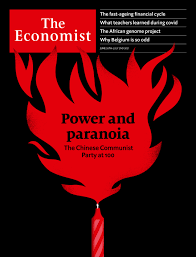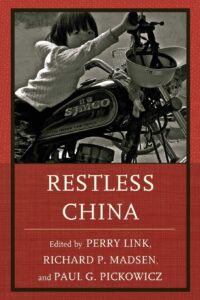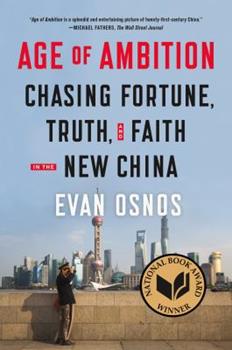 When the International Olympic Committee awarded Beijing the 2008 Summer Olympics, it promised the Games could improve human rights and civil liberties in China. There is no such lofty talk this time with Beijing’s 2022 Winter Olympics — the first city to host both the Summer and Winter Games — opening in just four months on Feb. 4, AP’s Stephen Wade writes.
When the International Olympic Committee awarded Beijing the 2008 Summer Olympics, it promised the Games could improve human rights and civil liberties in China. There is no such lofty talk this time with Beijing’s 2022 Winter Olympics — the first city to host both the Summer and Winter Games — opening in just four months on Feb. 4, AP’s Stephen Wade writes.
“The big difference between the two Beijing Games is that in 2008 Beijing tried to please the world,” Xu Guoqi, a historian at the University of Hong Kong, said in an email to The Associated Press. “In 2022, it does not really care about what the rest of the world thinks about it.”
Chairman Xi Jinping’s authoritarian acts are choking the nation’s “miracle” economy, reports suggest. Xi wants the Chinese Communist Party (CCP) to return to its “original mission” of economic, social and cultural control. He wants to see a “rejuvenation of the great Chinese nation”.
Will the Xi juggernaut succeed? The problems are that Xi is no Mao, in either intelligence or charisma, and the society that he rules is better informed and much more sophisticated than the one Mao ruled, notes Perry Link of the University of California at Riverside:
When Xi’s Ministry of Foreign Affairs announces a “Research Center for Xi Jinping Thought on Diplomacy” and another called “Research Center for Xi Jinping Economic Thought,” do intelligent people really go rushing to study “thought” that lies inside Xi’s mind, waiting to be appreciated? Of course not. People in the Mao era, whether in enthusiasm or in pain, took Mao’s commands to heart; in Xi’s case, the conformity is a mere shell.
 In Xi’s China, idealism is passé and conformity a shell for the ruthless pursuit of hierarchical power and private interests. In the short run, the most frightening possible outcomes for the Xi juggernaut are two: that it will fly or that it will crash, Link writes for the New York Review of Books’ October 21, 2021 issue:
In Xi’s China, idealism is passé and conformity a shell for the ruthless pursuit of hierarchical power and private interests. In the short run, the most frightening possible outcomes for the Xi juggernaut are two: that it will fly or that it will crash, Link writes for the New York Review of Books’ October 21, 2021 issue:
- Successful flight would be bad news for the Chinese people and for the people of the world. No one needs a model of technofascism that, with its facial recognition software and DNA registration, goes beyond what even Orwell imagined.
- On the other hand, a crash would also be bad news, at least for a time. It would bring chaos and likely bloodshed. One of the major accomplishments of the decades-long CCP rule is that it has obliterated all structures in society that might replace it. Whatever happens, I see no grounds for optimism in the short run.
Ideological redirection
 Central to Evan Osnos’ Age of Ambition: Chasing Fortune, Truth, and Faith in the New China is the looming conflict between the flourishing of individual aspirations and the heavy hand of the Party-state, notes analyst Elliott Zaagman.
Central to Evan Osnos’ Age of Ambition: Chasing Fortune, Truth, and Faith in the New China is the looming conflict between the flourishing of individual aspirations and the heavy hand of the Party-state, notes analyst Elliott Zaagman.
Rooted in Marxist-Leninism, with an outright rejection and paranoia towards “Western” ideas, it is clear that Xi’s version of the “China Dream” is quite different to what many Chinese have aspired towards over recent decades, he writes for the Lowy Institute’s Interpreter:
The ideological redirection mandates that the people subordinate their own ambitions to those of the state, demographic initiatives pressure them to form families that adhere to state goals, and the decoupling of China from the world means that the media, culture and education that many Chinese grew up loving is now considered “spiritual pollution”.
Beijing’s wolf warrior diplomacy resembles an iron fist in a silk glove, the Economist adds. Depending on political winds back home, China’s envoys learn to balance fist-waving threats with silken words about peace and friendship. Just now, the gloves are coming off.

Minxin Pei
Chinese civilization has survived paroxysms of tyranny before, however, and in the long run it will likely do so again, Perry Link asserts:
I agree with the China scholar [and NED board member] Minxin Pei (right), who has argued that, with or without high tech, the crux of tyrannical behavior still lies within the human mind, not in machines. Notions of “proper behavior”—for example, that people in superior social positions have duties to be fair to people in lower ones and are subject to moral criticism from bystanders if they are abusive—are deeply embedded in Chinese culture. Such values have, despite everything, survived Mao, and will outlast Xi Jinping. RTWT







